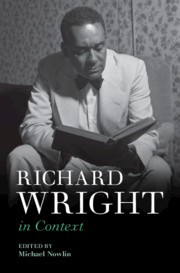Book contents
- Richard Wright in Context
- Richard Wright in Context
- Copyright page
- Contents
- Figures
- Contributors
- Abbreviations
- Richard Wright’s Works: A Chronology
- Introduction Richard Wright’s Luck
- Part I Life and Career, Times and Places
- Part II Social and Cultural Contexts
- Part III Literary and Intellectual Contexts
- Chapter 17 Chicago Sociology
- Chapter 18 1930s Proletarian Fiction
- Chapter 19 The Blues in Print
- Chapter 20 Realism and Modernism, Solipsism and Solidarity
- Chapter 21 The Literary Mainstream: Story and the Book-of-the-Month Club
- Chapter 22 Wright, Psychoanalysis, and Fredric Wertham’s Reading of Hamlet
- Chapter 23 Wright’s Black Boy in Context
- Chapter 24 Wright and Women Authors
- Chapter 25 Existentialism
- Chapter 26 Wright and Les Temps Modernes
- Chapter 27 Wright and Postcolonial Thought
- Chapter 28 Modern Poetry and Haiku
- Part IV Reputation and Critical Reception
- Index
Chapter 20 - Realism and Modernism, Solipsism and Solidarity
from Part III - Literary and Intellectual Contexts
Published online by Cambridge University Press: 08 July 2021
- Richard Wright in Context
- Richard Wright in Context
- Copyright page
- Contents
- Figures
- Contributors
- Abbreviations
- Richard Wright’s Works: A Chronology
- Introduction Richard Wright’s Luck
- Part I Life and Career, Times and Places
- Part II Social and Cultural Contexts
- Part III Literary and Intellectual Contexts
- Chapter 17 Chicago Sociology
- Chapter 18 1930s Proletarian Fiction
- Chapter 19 The Blues in Print
- Chapter 20 Realism and Modernism, Solipsism and Solidarity
- Chapter 21 The Literary Mainstream: Story and the Book-of-the-Month Club
- Chapter 22 Wright, Psychoanalysis, and Fredric Wertham’s Reading of Hamlet
- Chapter 23 Wright’s Black Boy in Context
- Chapter 24 Wright and Women Authors
- Chapter 25 Existentialism
- Chapter 26 Wright and Les Temps Modernes
- Chapter 27 Wright and Postcolonial Thought
- Chapter 28 Modern Poetry and Haiku
- Part IV Reputation and Critical Reception
- Index
Summary
Although it adopts and adapts both realism and naturalism, Richard Wright’s Native Son (1940) becomes, by Book Three (“Fate”), a modernist drama of consciousness. Native Son thus calls for a broad definition of the modern novel, one that reaches from Dostoevsky to Faulkner, includes Dreiser as well as Proust, and extends to Wright himself. Wright’s protagonist Bigger Thomas embodies the realist vision of the individual immersed in society and history as well as the modernist idea of alienation, for Bigger is both the doomed victim of forces beyond his control and the shaper of his own inner world of consciousness. By means of the tension between these perspectives, and by immersing the reader in Bigger’s internal quest for meaning at great length, Wright succeeds in crafting a novel that is modernist in its rejection of outmoded epistemologies yet eloquent on behalf of the voiceless.
- Type
- Chapter
- Information
- Richard Wright in Context , pp. 215 - 224Publisher: Cambridge University PressPrint publication year: 2021

